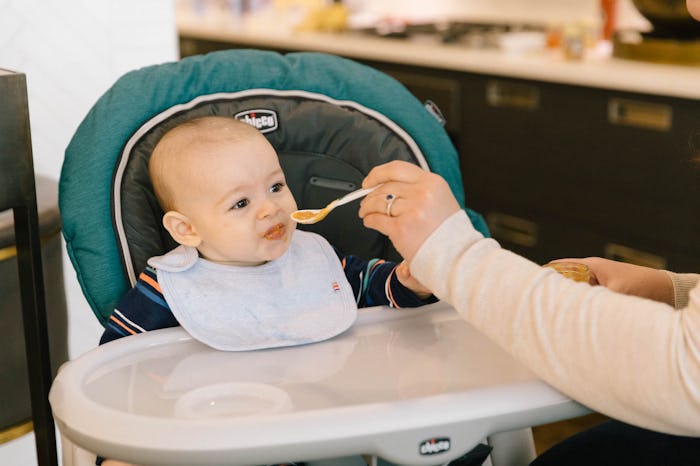Life
How Introducing Solids Affects Your Baby's Sleep, According To Experts
Despite the saying "sleep like a baby," babies don't actually sleep all that well. To make matters worse, just when you think your baby is finally "sleeping through the night," teething, an illness, or a sleep regression inevitably happens and your back at square one. As a sleep-deprived parent you're probably willing to try just about anything to help your baby get some sleep, but does introducing baby to solids affect their sleep? If so, will it hurt or help? Turns out, as with almost any parent-related question, the answer just might surprise you.
According to the Baby Sleep Site, the logic behind this theory is relatively simple: babies wake up when they are hungry, so starting solid food should help your baby sleep better and longer since their tiny tummy has something in it for a longer period of time. Unfortunately, like most things involving your baby, reality is not that simple. Although it is true that babies wake up when they are hungry, babies wake up for lots of other reasons, too. Wendy Sue Swanson, MD, MBE, told the Seattle Children's Hospital & Research Foundation that babies wake up due to their sleep cycles, brain waves, teething, behavior changes, developmental milestones, and even because they're simply a "bad sleeper" versus a "good sleeper." In other words, a stomach full of food isn't a 100 percent guarantee that your baby will sleep through the night.
If your baby is having trouble sleeping or is waking frequently at night, The Baby Sleep Site recommends you try to identify what specific issues are interfering with their sleep and find the right solution, rather than trying to solve what is likely a completely unrelated sleep problem by introducing solids. Plus, feeding your baby solids with the hope that they will sleep better might actually backfire. One study published in Academic Pediatrics showed that babies who started eating solids when they were younger than 4 months got 0.39 hours less sleep than babies who only received formula or breast milk. Trust me when I say that, as a new parent, you're going to want every spare minute of sleep time you can possibly get your hands on.
The American Academy of Pediatrics (AAP) agrees, recommending that parents start introducing solid foods to their babies at around 6 months of age to compliment, but not replace, breast milk and formula. The AAP goes on to caution parents against following outdated advice to feed babies cereal to help them sleep, warning them to never put infant cereal in bottles, as it can be a choking hazard.
Instead, to help your baby sleep the AAP recommends setting a consistent bedtime routine, making "daytime playtime," and putting your baby in their crib drowsy, but not asleep, so that they don't learn to depend on being held. Although it would be nice if starting solids was a simple fix to your baby's sleep issues, with a little trial and error (and a little luck) eventually everyone will get some well-deserved sleep.
